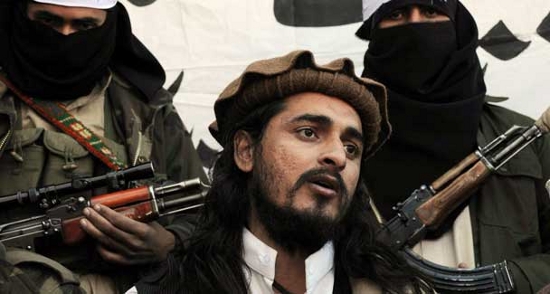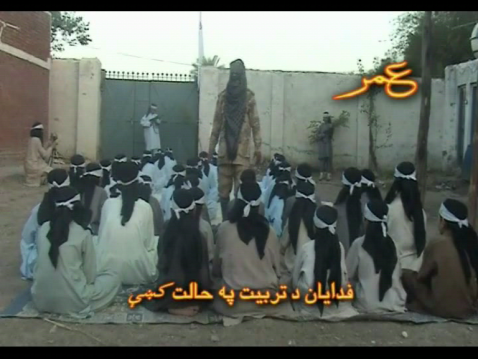The likely death of Pakistani Taliban commander Baitullah Mehsud has reportedly initiated a meeting of the Taliban shura to choose his successor.
Hakeemullah Mehsud and Qari Hussain Mehsud, both cousins of Baitullah, have long been thought to be the main rivals for leadership of the Tehrik-e-Taliban, or the Movement of the Taliban in Pakistan, the group Baitullah formed in December 2007. Others mentioned include Waliur Rahman, a Taliban commander in South Waziristan; Azmatullah Mehsud, a close aide to Baitullah; and Hafiz Gul Bahadar, the leader of the Taliban in North Waziristan.
Hakeemullah is reported to be in the lead to fill Baitullah’s role as the emir of the Pakistani Taliban, according to a report in AKI.
Below are profiles of Hakeemullah and Qari Hussain, the two main rivals for Baitullah’s job.
Hakeemullah Mehsud:
|
|
|
Taliban commander Hakeemullah Mehsud at a press conference in Peshawar in 2008. |
Hakeemullah, who is also known as Zulfiqar Mehsud, is Baitullah’s senior deputy. He also is a cousin of Baitullah and of Qari Hussain Mehsud, the notorious Taliban commander who trains child suicide bombers in South Waziristan.
Hakeemullah is one of the Taliban’s most able commanders and is a rising star in the Pakistani Taliban. He commands the Taliban forces in Arakzai, Khyber, and Kurram tribal agencies, as well as in some regions in Peshawar. In December 2008, Hakeemullah imposed sharia, or Islamic law, throughout Arakzai.
Hakeemullah has been leading operations against NATO’s supply lines in Khyber and Peshawar. His forces have been behind raids that have led to the destruction of more than 600 NATO vehicles and shipping containers. The raids have also destroyed two vital bridges. Pakistan has closed the Khyber Pass to NATO traffic six times since September 2008 because of the attacks. The raids on the supply columns moving through Khyber have forced NATO to search for alternative supply routes into Pakistan.
He has also taken credit for a series of suicide attacks and complex assaults in Lahore and Peshawar. He claimed the attacks under the guise of the Fedayeen-e-Islam.
Pakistani security forces and the US have tried to kill Hakeemullah. He was the target of a series of Pakistani strikes in the Arakzai tribal agency in mid-April. On April 1, the US targeted a meeting in Arakzai with a Predator attack aircraft after receiving intelligence that Hakeemullah might be in attendance.
Qari Hussain Mehsud:
|
|
|
Scores of children train to become suicide bombers at a camp run by Qair Hussain in Spinkai, South Waziristan. Image courtesy of AfPax Insider. |
Qari Hussain is a senior Taliban military commander in South Waziristan who also trains suicide bombers. He is the senior deputy of Baitullah.
Qari Hussain is based out of South Waziristan and is an ally of al Qaeda in Pakistan. He runs camps in South Waziristan that train children to become suicide bombers. Children as young as seven years old are indoctrinated to wage jihad in Pakistan and Afghanistan, a video taken at one of his camps in Spinkai showed.
The Pakistani military demolished Qari Hussain’s suicide nursery during a brief offensive against the Taliban in Spinkai in January 2008. The military launched a short operation after Taliban forces commanded by Baitullah overran two military outposts and conducted attacks against other forts and military convoys in the tribal agency. Qari Hussain’s forces helped fight the Pakistani military to a standstill.
The military seized numerous documents and training materials in the demolished camp. In May, a senior Pakistani general described the previous camp as a suicide “factory” for children.
The Pakistani military reported that Qari Hussain was killed in January 2008, based on intercepted Taliban communications. The military later reiterated that claim during the tour of the Spinkai camp on May 18, 2008.
Five days later, Qari Hussain mocked the military during a press conference held at a government school building in South Waziristan. “I am alive, don’t you see me?” Qari Hussain taunted.
Sometime in the spring or summer of 2008, Qari Hussain rebuilt his child suicide training camps in South Waziristan.










5 Comments
My money says Mehsud’s death, though perhaps a shock, will not slow one whit Taliban operations. The Taliban is a mass movement with a resilience based, not on personal leadership, but on collective belief.
ok, now when baitullah mehsud is dead, they will be needing a successor!
have a look of their ad!
http://getsalman.blogspot.com/2009/08/taliban-ad-post-for-country-manager.html
I reckon all the children are boys. It must be horrible to be a woman under the taliban! You have to wear a special dress and then live as long as you want!!!
well…it is horrible to be a women under them but for the natives its no problem!
and the special dress… its common over there!
the home of Baitullah Mehsud has been found!
and this time the work is done by Google engineers!
http://bit.ly/33uTVN